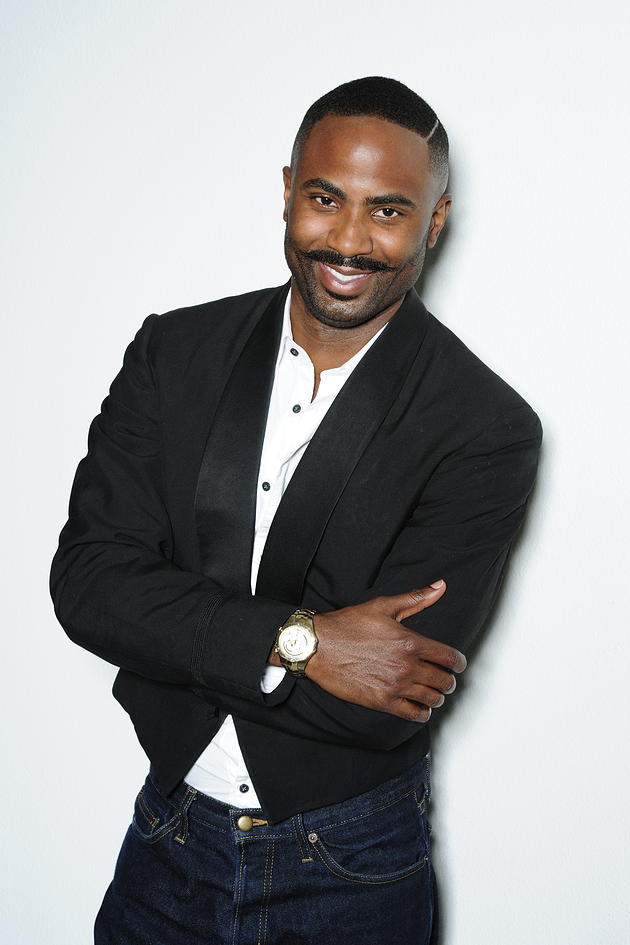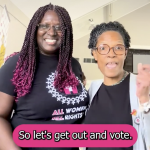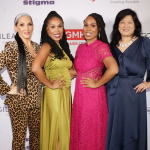 |
| Karim Odoms |
Jeug’e means to give life to. You might hear a woman say, “Just Jeug’e my hair real quick” when speaking to her stylist. Or a hairstylist may say, “Let me Jeug’e your bangs.” It’s like a movement of hair. I decided to take this word and make it my own! Jeug’e is everything! It’s my feeling or attitude, my movement, my way of being and the energy that I exude. The way I talk and the overall expression of my style and creativity is also my Jeug’e. My own special touch to whatever it is that I do, which allows me to see and appreciate the Jeug’e in others. I started saying this, and now all of my friends, family and colleagues call me Jeug’e or the Jeug’e Master everywhere I go.
How did you get into hairstyling? What’s your career path?
I became interested in hair and beauty at the age of 14. I would style my sister’s hair daily for school, school pictures and church, which eventually led me to becoming the neighborhood hairstylist. I eventually moved to New York to further my education at the Aveda Institute.
Upon graduating, I landed an apprenticeship with Ted Gibson, and my first job was key hairstylist for the New York Post’s “Pulse Fashion” tribute to the late Yves Saint Laurent. My career took off shortly after and I booked jobs working with Alicia Silverstone, Garcelle Beauvais, Taryn Manning, Tia and Tamera Mowry, Tika Sumpter, LisaRaye, and I also worked on videos for Lady Gaga.
I am now preparing to start working on season two of Nickelodeon’s Instant Mom and am in the beginning phases of developing hair care products and tools. I am writing a biography about my life. I am also planning to move to Paris in an effort to expand internationally, styling in couture fashion shows, magazine editorials and at top salons across the country.
My mission is to continue to develop and expand my brand of Jeug’e Master in the world of beauty, fashion and design. Through this, I would like to continue to inspire individuals and advocate for the LGBT and HIV/AIDS communities.
What have you done in terms of HIV advocacy?
In 2008, my best friend passed away due to complications of the virus, and it changed my life completely. He had not come to terms with what he was going through. He never told his mother and family, nor did he get treatment or the support that was available to him. Shortly after his death, another close friend of ours passed away, and it was then that I knew I had to do something.
At his funeral, I spoke out and revealed for the first time that I was HIV positive. This was a big deal for me, because I was quite the socialite in Philadelphia and in the LGBT ballroom community. You could imagine the shock among my friends and peers. The response, however, was a feeling that I cannot put into words. To hear people tell me that because of me sharing my story, that they too would either come out about their statuses, begin treatment or tell their families about what they were going through—it really ignited a passion in me. That was the beginning of my advocacy.
I’ve modeled for HIV medication ad campaigns. I continue to advocate for the cause by speaking at benefits and contributing to many AIDS Walks in Philadelphia, New York, Atlanta and in Los Angeles. However, I feel like I’m just getting started, because there is so much that I want to do.
Can you talk a little bit about when you were diagnosed with HIV?
I was diagnosed with HIV in April of 2003, at 24 years old. I was just recovering from a broken jaw after being assaulted and hit in the mouth with a gun. I was losing weight at the time, and I could sense that something was happening on a deeper level. I was not in denial about my promiscuous past, so I knew in my heart what was happening.
I was working at a salon at the time and was just working to live in the moment. I had separated myself from close relationships with my friends and family to avoid having to be honest. Acting out was my Jeug’e then. Partying, drugs and more sex was my escape. I was even more reckless and endangering myself and others, which was not something that I wanted for my life.
Since then, I have been able to seek God’s forgiveness and I’ve grown to forgive myself. Now, I am living a happy, healthy and safe life.
Have you ever had any career concerns or challenges being HIV positive?
In the beginning, I never thought I would make it to have a career. I had placed so many limitations on myself that it was hard for me to see a future in anything. Once I dealt with my status, I found the strength and confidence to go after my dreams. It became the driving force for me to be the best version of myself that I could possibly be.
There was a moment of clarity when I realized that I wanted to be different from my peers who were not open about their status. I wanted to make a difference in the lives of those who are going through the same thing. I want someone to look at me and say, “Because of you I didn’t give up on my dreams.”
Can you share some of your experiences with HIV stigma?
Fortunately for me, my loved ones have been extremely supportive and loving. Although I’ve experienced my share of stigma, it has mostly been in my dating life. There were times when I would engage in conversations and people would say things about people who are HIV positive. The names and terms they use are so disrespectful, degrading and hurtful. But once I would remind them, “That’s my truth also,” the looks on their faces were priceless.
You’ve worked in New York, Atlanta and Los Angeles. Have you found any differences in attitudes toward people living with HIV?
I have definitely seen a difference. Being from the East Coast, I feel there is a more open and relaxed perspective there. I have met guys who were negative and were open to dating and being in relationships with others who were positive. I have been in two relationships with HIV-negative partners.
I remember dating in LA, and the initial conversation goes like, “What’s your name? What do you do? What’s your status—are your HIV positive or negative?” That mini-questionnaire will determine if the person is interested in getting to know you as a human being. I don’t believe that all people who live on the West Coast are alike, but it’s one of those things that make you ponder.
I’ve learned to respect that everyone cannot handle dating someone with HIV, and that is OK. However, I find it funny when you meet guys who say, “It’s cool, no problem,” and then you never hear from them ever again—until you run into them at the AIDS Walk, and they’re like, “Oh I’m here supporting my friend.” *blank stare* LOL.
How would you describe working with Tia Mowry-Hardrict, the former star of Sister, Sister and the current Real Health cover girl?
I have been working with Tia since the beginning of January 2011. It has been a great experience full of more opportunities than one could ever wish to experience as a stylist and image consultant. She does it all: television, movies, commercials, editorial spreads, red carpet appearances and fitness, so there are no limits to my creativity.
My inspirations for her looks always come from the change of seasons. Sometimes we like to go in the opposite direction of what everyone else is doing and always take a classy, effortless and chic approach while remaining sexy, fun and flirty. We’re not afraid to play and mix it up a bit.
Currently, what are your favorite hair care products and trends?
I prefer to mix classic hairstyles with current trends. Bobs are always in and are one of my favorite haircuts and styles. Sexy tousled waves transcend from day to night with little effort. Cute bangs never hurt a girl; they enhance the cheekbones and bring mega attention to the eyes.
My favorite product, without a doubt, is Moroccan Oil. It creates great shine luster and also works as an amazing conditioning treatment. I also cannot live without my L’Oreal Paris Elnett Hairspray. It gives the hair great hold but keeps the movement flowing. Motions Foaming Mousse gives the hair great body and lays those baby hairs and fly-aways like sweet baby Jesus.
Do you have any tips or styling suggestions for girls with natural hair?
Natural hair isn’t just “I have no relaxer or chemicals in my hair. I don’t brush or comb it—I just go.” That’s naturally a no-no. Moisturize your natural hair every two weeks with a coconut oil treatment and comb through evenly. No matter how long or short your hair is, keep it trimmed.
A Moroccan Oil Repair Mask and Suave Detangling Spray should be your hair’s best friend, and every now and then press it out, not only to switch up your look but also to let the air get through to your scalp. Twist and braid your hair in two to four sections before going to bed, and use a silk pillowcase to prevent breakage and roughing up the cuticles.






Comments
Comments